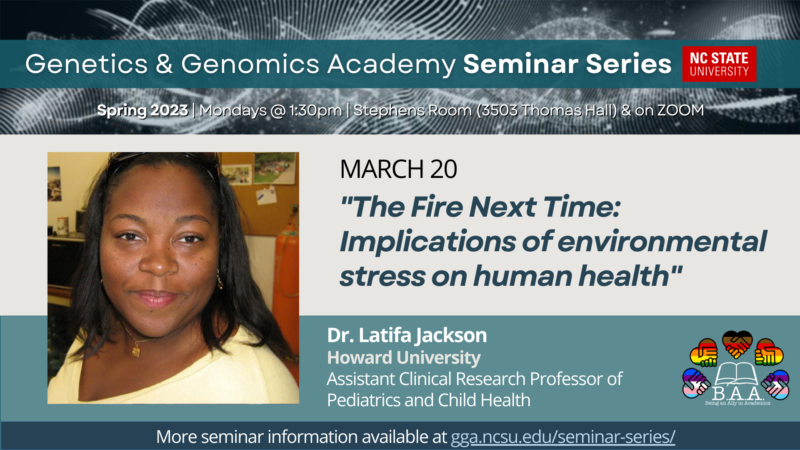
- This event has passed.
GGA Seminar with Dr. Latifa Jackson – Decolonizing Human Genetic Research Workshop Series
March 20, 2023 @ 1:30 pm - 2:30 pm

GES Video Library (current) | Video Archives | Podcast | @GESCenterNCSU | Newsletter
Genes & Society: Decolonizing Human Genetic Research Workshop Series
GGA Seminar – The Fire Next Time: Implications of environmental stress on human health
Dr. Latifa Jackson, Assistant Professor, College of Medicine, Howard University
Website | Twitter @latifajackson
Abstract
Increasingly, computational scale data is being leveraged to gain insights into a host of human health issues. Recent studies suggest that socioeconomics, psychological determinants and biology contribute to immune weathering in young adults. Few studies have examined violence exposure’s effect on healthy preclinical young adults who have had no diagnosed chronic diseases. We have shown that there are gender differences to experienced violence and that immune stress biomarker concentration is correlated to the experience of sexual or racial discrimination. Our more recent findings suggest that the processing and potential internalisation of adverse experiences may be an even more important factor in modulating the biological stress responses in African Americans. This work has recently been expanded to include methylation assessments in high exposure young men with changes in methylation patterns seen in key signaling and neurological pathways.
Schedule of Events:
March 20th: Genetics and Genomics Academy Seminar 1:30 – 2:30 PM
- “The Fire Next Time: Implications of environmental stress on human health”
- Stephens Room (3503 Thomas Hall)
- This event will be held In-Person
March 20th: Fireside Chat with Dr. Jackson 6:30 – 7:30 PM
- Erdahl-Cloyd 2304, DH Hill Library
- In-Person Q&A Session
March 21st: Genetic Engineering and Society Center Colloquium 12 – 1 PM
- “The Genomic Fire Next Time: Reflections on charting your scientific path”
- 1911 Building, Room 129
- This event will be held In-Person
While the events over the last several years in the United States have placed an important focus on issues of race, diversity, and systemic inequalities; these issues are long-standing and embedded within institutions, academic disciplines, and the broader scientific community. In response to the most recent examples of these inequalities, NC State has stated that “Diversity is critical to NC State’s mission” and that “New perspectives deepen our understanding, strengthen our community and propel our innovation.” Building upon NC State’s mission statement and past successful race and science events, NC State’s Being an Ally in Academics (BAA) group has collaborated with Genetics and Genomics Academy, the Genetics and Engineering in Society Center (GES), and TriCEM to organize a new two-day workshop series titled, “Genes and Society: Decolonizing Human Genetic Research”. The goal of this series is to explore the current and historical intersections of racism, systemic inequalities, and human genetic research with an emphasis on inviting diverse and historically underrepresented groups as seminar speakers.
